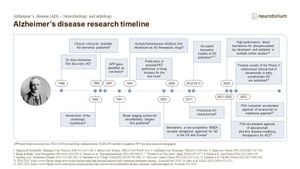ATLANTA, Ga. - A significant political event unfolded recently as voters across Georgia returned to the polls for runoff elections on December 3, 2024. These elections were pivotal, particularly for many positions left undecided after the general elections held last month. The brisk voting encapsulated key races across the metro Atlanta area as voters strived to finalize their representation at various government levels.
Polls for these runoff elections closed across most counties at 7 p.m., with the Atlanta City Council Post 3 race stretching until 8 p.m. The stakes were especially high, as candidates fought fiercely for positions following the previous elections where no candidate managed to secure the required majority.
Candidates and Key Races
Several hotspots emerged during these elections, showcasing strong competition among candidates. Key races included the Atlanta City Council Post 3 contest, featuring Democrat Eshé Collins taking on Nicole Evans Jones. DeKalb County also hosted several notable races, including District 3 and 7 commission seats contested by Nicole Massiah vs. Andrew Walter Bell and Jacqueline Adams vs. LaDena Bolton, respectively.
Further down the line, Doraville’s City Council District 1, Post 2 put Andy Yeoman against Taylor Ray, highlighting the active civic engagement within local governance. Over in Henry County, the Commission District 4 elections featured Michael Price competing against Vivian Thomas.
Gwinnett County also had its share of electoral drama, with the City Council District 5 contest where Doug Ingram faced Michelle Sims.
These local elections play a substantial role at the district and county levels, reflecting broader concerns and priorities within the community.
Recent Results from Southeast Georgia
While Atlanta featured fierce competition, Southeast Georgia's runoff elections showcased different dynamics. Specifically, the Camden and Ware county elections were of note, particularly because they followed general elections where no candidate captured over 50% of the votes.
Significantly, Shawn Roberts emerged victorious over Jeane Walker for the Waycross City Commission District 1 with approximately 70% of the vote, displaying strong voter support. Across the border, Greg Lockhart secured his win against Lisa A. James for the mayor of St. Mary’s with impressive numbers—Lockhart earned 1,070 votes against James's 436.
Crucially, the St. Mary’s City Council Post 5 race drew attention as Allen Franklin Rassi Jr. narrowly defeated Nick Harris by less than 50 votes, marking it as one of the tightest contests of the day. This close race highlights the importance of turnout and engagement among voters, especially within local elections.
Similarly, Paul Chamberlin triumphed over Jannett D. Bradford for Kingsland City Council Post 1 by just 139 votes, underlining how each vote counts significantly during these decisive elections.
Voter Engagement and Turnout
What’s important to note here is the active engagement from voters, which is no small feat considering the backdrop of the political climate. While turnout was good for both areas, the enthusiasm behind the campaigns and the varied issues at stake likely driven voters to the polls.
This year’s elections have likely evoked mixed feelings due to the polarization seen across the political spectrum, yet local governance still captured the interest of many, demonstrating the significance of having local representatives they believe reflect their values.
While results continue to pour in, the emphasis now shifts to the candidates' policy promises and how they plan to fulfill them as they settle into office. Each candidate, now facing the electorate’s mandate, must pave the way for their communities, whether through infrastructure improvements, educational reforms, or economic initiatives.
The Implications for Future Elections
The recent runoff elections not only determine local leadership but also reflect the political pulse of Georgia as it moves toward the pivotal 2024 Presidential Election year. Each candidate’s victory or defeat could serve as indicators for the parties' strength heading toward larger electoral battles.
Political analysts will be eager to dissect the voter demographics, examining who turned out, which issues motivated them, and how these results set the stage for the upcoming races including the nationally watched presidential election.
Georgia has become increasingly competitive, showcasing shifts in voter patterns and preferences, particularly among younger voters and suburban populations. The outcomes of these local elections could send ripples through statewide races, as candidates will be watching closely to glean any insights on voter sentiment.
For Georgia, every election is more than just local governance; it’s about crafting the state’s future. Voters are increasingly aware of their power and responsibility, making every single ballot cast pivotal.



